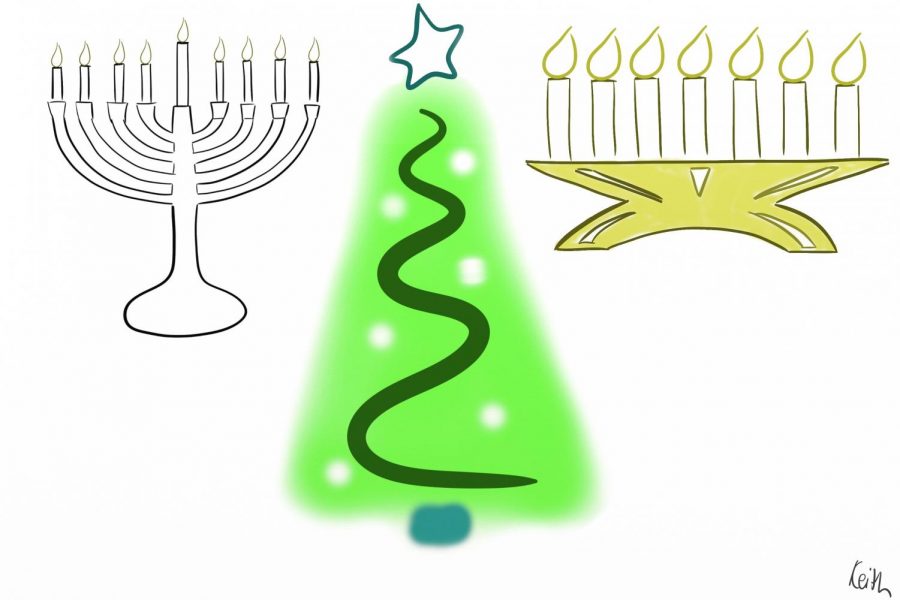‘Tis the season
This visual represents the symbolic items used for Christmas, Hanukkah and Kwanzaa
As the days get colder and colder and the snow starts to sprinkle down from the sky, holidays are just around the corner. Christmas, Hanukkah and Kwanzaa are all celebrated within the month of December. Each holiday is associated with a religion or culture. Christmas being Christanity, Hanukkah being Judisium and Kwanzaa being Africansim. All these holidays last for one day or more depending on the traditions associated with these holidays.
There are many different traditions that go with these holidays. Christmas is celebrated on Dec. 25. Typically, people decorate their houses with a tree with ornaments and stockings that are hung up on the chimney for presents. Usually there is a dinner that follows that night.
Hanukkah is very different. Hanukkah is also sometimes called The Festival of Lights. This is a nine day event that tends to start on the 25th day of either November or December. There is a candleabrum that holds nine candles. On each of the nine days of the festival, a new candle is lit.
Kwanzza follows similar principles as Hanukkah. Instead of nine days, there are only seven days. This typically starts on Dec. 26 and goes until Jan. 1 of the next year. There is gift giving as well as a feast during this time. The seven candles are placed in a holder, called a kinara, which is to symbolize the seven principles of the holiday. Those principles are unity, self-determination, collective work and responsibility, cooperative economics, purpose, creativity and faith. Through those seven days, just like Hanukkah, a new candle is lit each day to show that symbol.
“Merry Christmas!” is a phrase that is used very frequently during the holiday season. People have formed strong opinions on this wording and if it is offensive or not. Some may think that the phrase “Merry Christmas” is offensive to the people who celebrate other holidays around this time. However, this is not typically the case. The phrase is just not inclusive. It is the same as saying “Happy Kwanzaa” or “Happy Hanukkah.” People who do not celebrate the other two or any holiday at all feel left out.
“Happy holidays!” is a more inclusive phrase that is not offensive. “Happy Holidays” leaves no page unturned. There are so many people in the world that all have different belief systems or none at all. Happy holidays includes that everyone from the ones with no religious beliefs to everyone that has a different one. In the world today, people like to feel as though they are included as much as possible.
“Typically, I say Merry Christmas. I do not feel that saying this is offensive in any way as people have their own belief system and other people should be respectful and mindful of that. I also do not feel offended in any way if someone says Happy Hannaka or Happy Kwanzaa to me as people get to make that choice. I do feel more included if someone comes up to me and says Happy Holidays to me rather than just Happy Hannka,” freshmen Brigette Richard said.
There are ways to include everybody for what the believe in without seeming offensive to other cultures. Simply by saying happy holidays instead of “Merry Christmas,” “Happy Kwanzaa” or “Happy Hanukkah,” people are including more than just the typical person. The inclusion of people tends to give a positive effect.



